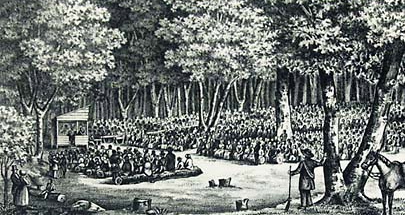Today (August 6) was the day in 1801 when a Presbyterian communion service in Bourbon County, Kentucky, turned into a major revival. The service grew and grew, carrying on until August 12 and attracting pehaps 25,000 people. The results of the Cane Ridge revival, America’s strange way of starting the nineteenth century, changed the religious geography in ways that are still very much with us.
It broke apart Presbyterianism, got Cumberland Presbyterianism going, prepared the ground for Shakers (whose founder, Ann Lee, coincidentally, had arrived in America on August 6, this very day, in 1774), became a rallying center for the Restorationist/Stone-Campbell/Disciples of Christ movement, let loose all kinds of heterodox preaching.
Scottish Presbyterians (and Ulster Presbyterians as well) had been holding these special regional communion services for hundreds of years, and back in the old world, they sometimes got big and noisy. In times of persecution especially, they thrived in rural settings. The Cane Ridge communion service was like one of these, but something American happened to it along the way.
Preachers from numerous denominations arrived, set up pulpits in tree stands, and preached; sometimes as many as seven preachers at once addressing different crowds throughout the woods. There was a lot of fainting, swooning, shouting, and dancing as the days went by. In the aftermath, Presbyterians pretty much washed their hands of it and backed away. It was the Methodists who, while denouncing the excesses of the event, nevertheless were proud to claim ownership. They retroactively dubbed it a camp meeting staffed by circuit riders, and promoted similar revivals elsewhere.
For example, frontier Methodist preacher Peter Cartwright was sixteen when the Cane Ridge revival broke out, and while he did not attend it and was not converted until later that year, he tells the story of Cane Ridge in the same chapter of his autobiography that contains his conversion.
From this camp-meeting, for so it ought to be called, the news spread through all the Churches, and through all the land, and it excited great wonder and surprise; but it kindled a religious flame that spread all over Kentucky and through many other states. And I may here be permitted to say, that this was the first camp- meeting ever held in the United States, and here our camp-meetings took their rise….
So the Cane Ridge revival was transformed, retrospectively, from a Presbyterian communion service to a Methodist camp meeting. And who loves Cane Ridge enough to claim ownership of it today? About one century later, the Pentecostal revival broke out at Azusa Street, and the descendants of that movement, including Pentecostals and Charismatics, look back to Cane Ridge as part of their spiritual heritage. It is still possible to get into a serious argument about whether the louder and more ecstatic behaviors at Cane Ridge bear any relation to charismatic experiences in our own generation.
